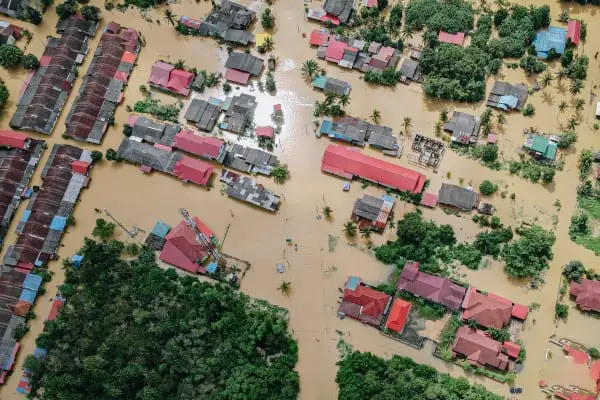This page contains affiliate links. This means if you a follow a link and make a purchase, at no additional cost to you, Humanitarian Careers will receive a commission. Thank you for supporting the site.
We see disasters strike and affect the lives of millions of people each year. Most of us are aware of the key role disaster management plays in responses to such crises. However, over the recent decade’s disaster management has grown to become an established career and academic field. Therefore, it is only right to ask, what really is the importance of disaster management and how does it help people affected by crises?
Disaster management is important because it aims to ensure an effective and coordinated response to disasters. Through work to save lives and reduce the impact of crises on affected communities, disaster management is fundamental to timely and effectual assistance to disaster hit people.
Now we have an overview, let’s breakdown the major reasons why disaster management is vital…
Improves Response Management
The first reason why disaster management is important is because it oversees the response to a disaster. Disaster management coordinates all aspects of disaster response aiming to effectively mobilise the required equipment, resources, staff and aid needed to assist people affected by disasters. Control and oversight of a disaster response is a big reason disaster management is vital.
The purpose of disaster management is to reduce the impact of disasters on affected populations and assist people to recover. Disaster management is important because it establishes effective tools, methods and techniques for how responses should be directed. Disaster management also works to limit the hazards and long-term negative effects of disasters and this is another reason it is crucial.
Disaster management includes a wide range of systems and processes that govern how responses are coordinated. Disaster management also covers standard principles of emergency response that are fundamental to effective assistance to disaster hit communities. Disaster management is foundational to overseeing effective disaster responses.
Imbeds Coordination of Actors
Disaster management is important because it is key to coordinating different actors within a response. Disaster zones are highly complex and often confusing environments. Good coordination between disaster responders is vital to ensure effective assistance to disaster hit communities. Having people skilled in disaster management is vital to make sure responders work together and coordinate their efforts.
As disasters hit, they disrupt infrastructure and communications. It can be hard to gather information and build a strong understanding of how a response is developing. Disaster management is important because it puts systems and processes in-place that allow responders to coordinate. Strong coordination of responders is fundamental to effective disaster management.
When disasters occur, many organisations respond. The rush for actors to begin operations can mean confusion and duplication of efforts. Management of disaster zones is crucial in coordinating responder through all stages of a disaster. Disaster management makes sure all responders work in cooperation and this is major reason why it is important.
Ensures Effective Liaison
When a disaster hits, one of the major actors is the local and national government responsible for the area. Disaster management is important because it establishes how responders should liaise with these authorities. Failure to enshrine effective liaison into an actor’s disaster response can significantly reduce its ability to assist people.
Many authorities have strict guidelines for how disaster responses should be ran within their jurisdictions. They require all actors to feed-into their mechanisms and ensure their response is in-line with the local and national disaster response plans. Having qualified personal in disaster management is important because it ensures effective liaison is built into an organisation’s response.
We well as governmental agencies that are involved in disaster response, there are also a wide range of state actors that require effective liaison as part of a disaster response. Disaster management ensures that emergency services and military responders work cooperatively with NGOs, civilian and international organisations as part of a disaster response. This a big reason why disaster management is crucial.
Improves Management of Resources
Resources are a kay part of disaster responses and managing them effectively is crucial to success. Disaster management is important because it governs how resources should be used in a disaster zone so as to maximise their effectiveness and limit wastage. Well managed disaster responses allocate resources as needed and this is a vital reason for having trained disaster managers.
The resources used in disaster management include equipment, human resources, vehicles, premises and humanitarian aid supplies. Emergency responses are complex operations that must be established urgently. Disaster management practices contain key guidelines and principles of how resources should be brought-in, deployed and utilised and this is why it is crucial.
When crises hit, resources are rushed to disaster areas as the response is launched. Disaster management is important because it avoids allocating resources where they are not needed. It also gives a framework for responders to know what resources should be used. Correct allocation of resources is foundational to a successful emergency response and this is why disaster management is key.
Disaster Management Online Courses
If you want to learn more about disaster management and why it is important, the University of Pittsburgh offers an online short course in disaster preparedness. We think it’s the best beginner level course on disaster management. Follow the link to visit the course’s page.
For those interested in disaster risk reduction, we recommend the online course offered by Coventry University. It only takes around six hours to complete and provides a concise overview of the key concepts of disaster risk reduction. Click the link to be taken to the course page.
Disasters and conflicts often overlap. The online course When Disaster Meets Conflict by the Erasmus University Rotterdam is one of the best ways to learn about the importance of responding to disasters even during times of war. We’ve linked to the course overview.
Coordinates Disaster Preparedness
Preparedness is one of the most important parts of disaster management. Disaster preparedness covers the planning measures taken before a crisis hits to ensure quick and effective responses. The aim is to assess vulnerabilities, analyse potential threats and develop mitigations to limit the impact of disasters. Preparedness is a huge reason why disaster management is important.
It is not often possible to prevent crises events occurring. However, preparedness allows for measures to be put in-place to protect communities from the effects of disasters. This is hugely vital to limiting the effects of disasters. Disaster preparedness also means the pre-positioning of resources so that they can be deployed rapidly after a disaster hit. This is another important reason for disaster management.
Disaster preparedness is a foundational part of disaster management. As an ongoing process involving emergency responders, communities, donors and wider stakeholders, disaster preparedness is crucial to an effective emergency response. Preparedness, and its importance to a successful response, is a strong example of how crucial disaster management is.
Ensures Lessons Are Learnt
Many areas that are hit by disasters are struck more than once. There are some communities that are especially vulnerable to disasters. Disaster management is important because it means that responses to previous disasters are learnt from, and communities can utilise this knowledge to develop improved future responses to disasters.
Another reason why disaster management is important is that it ensures that the latest skills, methods and technologies are used in emergency responses. Disaster management is an ever-growing field of academic study and it is crucial to improving techniques and ways of working. Continuous developments are always improving how disaster responses are managed.
All disasters occur within a context. Disaster management is crucial in ensuring emergency responses are rooted within the political, social and economic realities of the context they are in. Ensuring buy-in from local actors and developing strong relationships with key stakeholders is crucial to an effective emergency response. These are core parts of disaster management and big reasons why it is important.
It Saves Lives
The final, and perhaps most important reason why disaster management is vital is that it saves lives. Strong disaster management improves an emergency response, meaning actors can assist affected people better. The overall aim of disaster management is to save lives and limit the impact of crises on people and this is a major reason why it is important.
Disaster management covers the wide-range of skills that are needed to oversee responses to large-scale emergencies. Highly qualified and trained disaster managers are crucial to coordinating effective actions. The better ran an emergency response, the more lives it will save. Reducing the number of lives lost is one of the main reasons for disaster management and is a big factor in why it is so crucial.
When disaster strike at large populations the loss of life can be enormous. Although the initial disaster can claim many lives, often the effects following can continue to cause death, injury and destruction. Disaster management is vital because it can reduce the impact of disaster after they occur through effective management of timely responses. Saving lives is the ultimate aim of disaster management and really why it is so important.
If you want to learn more about the importance of disaster management, check-out our list of the top online courses in disaster management here.




